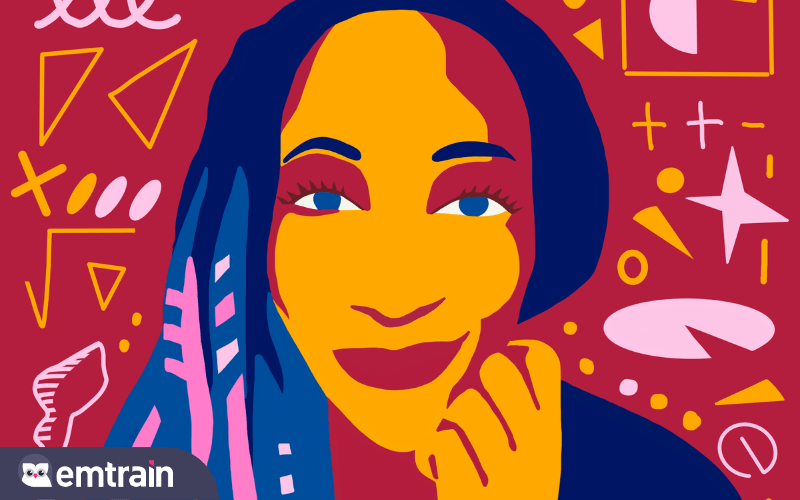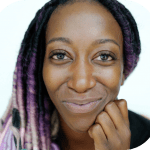From Very Humble Beginnings to Designing Product at Google, Uber, IBM, and Intel
We sat down with Nancy Douyon, design ethicist and product philosopher. Nancy has been a UI/UX designer (User Interface, User Experience) at Google, Uber, IBM, and Intel. She is an Emtrain Expert on Unconscious Bias. Nancy was interviewed in June 2020 by Laraine McKinnon, Emtrain’s Talent & Culture Strategist. This is a 4-part interview.
Laraine: Nancy, you describe how you came from very humble beginnings, yet you learned to code at the age of 12 and you’ve influenced design at huge tech companies and the world beyond. Tell me about your upbringing, and how it led to your success.
Nancy: I grew up with parents who are middle school educated from Haiti, trying to raise their children in America, but living in a Haitian community, where no-one necessarily needs to speak English. It was very difficult for them to figure out how to get me what I needed.
For example, if I was interested in gymnastics, they didn’t know what to do, where to go. So, when I was about 11 years old, I got fed up with the fact that no one was helping me with any of the questions I had. I was reading, maybe too many books, and the school that I was going to was not great. And context was a little confusing for me because I was living in the Haitian community.
Still at age 11, I found this magazine and on the back of the magazine, it said: “Do you have questions?” And I assumed that meant any questions that I might have, though they probably meant about the contents of the magazine. And there was an address, back when people used to mail things.
I had read this book on geographic information systems (GIS) and I decided (Laraine chuckles, Nancy pauses) I know, my parents thought ‘the stronger the cover, the smarter I would be’ so they just found random hardcover books and gave them to me — So I was reading this great book on GIS, which is basically mapping data points. I mapped my way to the location.
Then, I plotted my escape from home, left my house, and went to the address of the magazine.
When I got to the door, this woman arrived and said, “You’re not supposed to be here. “You’re a child, you can’t be here unless you’re 14.” And so I lied and said, “I am 14.” Then she asked another question – a very American question: “when’s your birthday?”
There was no value in knowing my birthday at my age. It was helpful for things like passports. But it wasn’t like we had much in money to give gifts out. And we certainly were not into astrological signs. We baked cakes to celebrate birthdays which came up when they came up. It was just never something we thought was a priority to know.
I confidently said, “I don’t know.”
Her next question was, “where do you live, what’s your phone number.”
I didn’t know my phone number, and only kind of knew my address. I wasn’t allowed out of the house, so there was no reason for me to know these things. I wasn’t allowed to make American friends, so there was no reason I would know my number. My Haitian community communicated through actual physical interactions through visits or community planned meetings.
So, this woman, unclear on what to do with me, sits me down at a computer and teaches me solitaire. I am so impressed by this game. It’s the first time I actually interacted with a computer. I mean, I submitted my school assignments by typewriter because that’s what my parents could afford at the flea market.
Therefore, my first real interaction with a computer was playing solitaire. And I’m asking her all types of questions that she thinks are absolutely ridiculous. Like, why is the background green? And she’s like, “no one cares. This is a game. You’re supposed to have fun.”
And I’m thinking, ‘you just do things without trying to understand why they’re there? That doesn’t make any sense to me.’
I had learned from my first-grade teacher that there was no such thing as a dumb question. So, I wasn’t having it. Just wasn’t having it.
Eventually, my mother found me. I have no idea to this day how she found me. She dragged me out and took me home. I was terrified. The biggest punishment you can give to a Haitian child is to say nothing, and she had no words for me. Which is insane. She had no word for me the next day, and she had no words for me that following day.
When Monday came, she dressed me up in the nicest clothes I had, which was really not cute by American standards, and she took me back to that location of the magazine. “You will ask these people all the questions you have, and try to get all the answers you can get, because I know I can’t help you,” she said. It was a secret we held from my father because as a young lady, I was not allowed to leave the house or be someplace outside of school without my parents at any point in time. It was just plain sexism to be honest.
And these magazine folks didn’t know what the hell to do with me and my mother didn’t speak English. They tried to explain to her that this is a magazine… But they let me stay and tried to figure out how to answer my questions. They found things to keep me active. They saw my interest in computers and found a robotics camp for me.
I learned robotics that summer at age 11. And then after that I said “okay, now what”…and they were like ‘you’re an engineer, yay.’ And I thought, I cannot go home and break another fan for its motor. I need something else. And so, they ended up dropping me off at MIT.
Laraine: They dropped you off at MIT?! What are the chances of that?!
Nancy: I met with Mitchel Resnick who is now world renowned at the MIT Media Lab for their Lifelong Kindergarten Program. His lab had a bunch of Legos in it. So, as far as I’m concerned, this is a space for children. I started tinkering around with the Legos. He tried to explain to me that these are experiments. And at the time, there was something called Lego Mindstorms, where I could program and build a Lego vehicle to do something. And here I am being introduced to it, not in a school but in this computer technology space. No one told me that this was coding or designing a program or anything like that. They just simply said: “Just try something new. You can’t break anything. Play around with it and see what comes of it.”
And so that was my introduction to technology and I fell in love with the idea of manipulating things to create some kind of reaction or behavior. It was extremely hard when I first started doing this. I was an ambitious person. I said, “all right, my car that I built is going to parallel park.” Which is not something you can really just say you can do. And my car didn’t even move much those first few days. It just spun in circles.
But eventually I figured out how to do it. I didn’t have any pressure with time, there was no pressure with how to learn or what to do. It was simply said that nothing could break, which was terrifying to me because I was sure everything could break.
I ended up in a program called the Intel Computer Clubhouse. It was a program that they created at MIT to teach computer technology to inner-city kids in hopes of building our natural amazing talents. I ended up getting my first job assisting the program and became a powerful educator among my peers.
By this point, I was in a Foster care. Eight different foster homes to be exact. My parents had a hard time in America. So, they went back to Haiti. I learned Photoshop before anyone knew what Photoshop was. Then, I started teaching at the Museum of Science, at the Technology Center within it and I also started managing the Computer Clubhouse. Soon I also worked as a Tech Coordinator at the YWCA, teaching young women how to use Photoshop, how to code and program things, how to design a web page—all by the age of 14. A few years later, I started working at Harvard in cybersecurity. In these environments, no one had ever told me I couldn’t do something.
Laraine: That’s an incredible journey. Things changed for you somewhat when you went to college…
Nancy: Yeah. In college, white male classmates triggered a lot of insecurity for me. Before college, no one had ever suggested I couldn’t do something simply by looking at me. My all male project teams would devy up work and give me things they thought I could handle…like the report out. They assumed that I could not code without even knowing my background, so I believed it. Yet I was already working at Harvard in cybersecurity…so that didn’t make total sense. I further convinced myself that men were just better at these things because there were so much more of them in my field at that point.
There was a lot that was confusing for me. How could I get started at age 12 and learn so much advanced technology but yet wasn’t sure where I was going with it. It certainly didn’t help that people wouldn’t give me challenging work. I also felt like these gatekeepers of all things Tech wouldn’t give me access to awesome opportunities.
By the time I got to college it was like, ‘well, I could follow what you say…or I could figure it out myself and I may find a different way of doing this.’ I should tell you, the idea of making your own path, was shunned upon by the education I received at inner city public schools in Boston. For example, my parents taught me the French model of doing mathematics. It is slightly different from how Americans do math, and I would get failing grades because even though my answer was right, they couldn’t figure out how I did the work to get to the answer. I was writing in alien code to them.
It is very confusing to be taught early on that you shouldn’t take a different path—yet also learning that you always have the choice to take a different path—which is kind of the premise of my life
Laraine: You mentioned in college that people were telling you ‘you can’t code’ and you sort of assumed that they were correct. Looking back on it, do you think the people who told you ‘you can’t code’ believed it, or do think they were bullying or relying on stereotypes?
Nancy: In hindsight, the people who were confronting me had never seen someone like me before: a Haitian kid from the inner city who has broken Boston English, and a female at that. It just didn’t sense to them, so ignorance played a role. Most came from suburban majorly white private schools and I didn’t. It was a struggle: to be limited because you didn’t feel familiar. I had a professor in grad school at University of Michigan tell me I spoke like a trashy Boston person, so I taught myself this neutral American accent, you are currently hearing.
Also, I think at that point, society had convinced themselves that men were associated with certain things. Even though, growing up, my mentors were women in computer science—in fact they had told me, in the 70’s, computer science was considered “a woman’s job” because it fell in the secretarial category. 50% of people studying CS back then were women.
Things turned around when I got to grad school and I realized the value of understanding human behavior and their interactions with technology. I found value by showing a different perspective.
And that’s how I ended up working for Big Tech places like Google, Uber, IBM, Intel. I helped them make sure we’re looking at things through a wider lens. We’re designing products that we want to deliver out to users all over the world, so we have to understand things from those users’ perspectives. I don’t look like a lot of the people I work with, and I have a very different life experience than most of them. It helps me see the world differently, and hopefully design for greater inclusion.
Read part 2 of our interview with Nancy Douyon on designing for inclusion. And check out the LinkedIn Live conversation on How to Be a Better Ally.
Nancy Douyon is available for fireside chats on human centered design and workplace inclusion.










